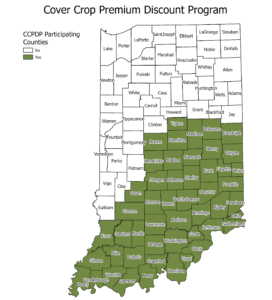
(Indianapolis, IN) – The Indiana State Department of Agriculture, The Nature Conservancy, Indiana Agriculture Nutrient Alliance and the United States Department of Agriculture’s (USDA) Risk Management Agency have joined forces to implement the Cover Crop Premium Discount Program for the fifth year in a row.
This program will reward farmers who plant cover crops by providing a reduced premium on their crop insurance.
The discount program was designed to promote planting additional acres of cover crops that are not covered by other state or federal incentives.
This program is available in 50 of Indiana’s 92 counties, including Ripley, Decatur, Franklin and Dearborn.
“Our agency is thrilled that we were able to roll out this program again thanks to the support from USDA and The Nature Conservancy,” said Don Lamb, director of the Indiana State Department of Agriculture. “Last year this program was available to 26 counties and we have nearly doubled that for 2025. Cover Crops provide numerous benefits for soil health, but they come at a cost, so this program is key to ensuring farmers have the support necessary to build up their soil health.”
Over the last year, this program has had great success with 101 farmers participating, resulting in more than 30,000 acres of cover crops on Indiana farmland in the watershed.
This program will provide farmers with a unique opportunity to receive financial incentives for implementing cover crops on their operation. Farmers who plant cover crops on owned or rented acres will receive a $5 per acre crop insurance premium discount. Farmers who planted cover crops in the fall of 2024 are eligible to apply.
Cover cropping has many benefits including increased organic matter, improved soil biology as well as better water infiltration and water-holding capacity. This practice also prevents nutrients and sediment from running off the farm, keeping them out of nearby waterbodies and streams. Hoosier farmers planted a record 1.7 million acres of living covers in 2023 and, apart from corn and soybeans, are planted on more acres than any other commodity crop in Indiana.
Seeding of cover crops must follow best agronomic practices in terms of appropriate seeding rates, seed mixes and seeding dates to ensure objectives of the cover crop are being met. To ensure the practice provides the best results, termination must be completed in the spring. Enrollment is first come-first served and there is a 750 acre cap. This program is also only available to fields not enrolled in other conservation programs.
Larry Clemens is the Indiana State Director of The Nature Conservancy.
“We are excited to again support the Cover Crop Premium program and offer an additional option to Indiana farmers that are nationally leading the way in the adoption of soil health practices,” Clemens said. “The Cover Crop Premium program jumped from 26 Indiana counties last year to 50 this year, giving more farmers flexible solutions to continue and expand the use of cover crops outside of other programs. Cover crops improve soil health, water quality, water holding capacity of soils, and they can sequester carbon, decrease weed pressure and reduce the cost of inputs.”
The program is funded by a Clean Water Indiana grant and support provided to The Nature Conservancy by the Cummins Foundation and CenterPoint Foundation.
Applications are due March 15, 2025, or when available funds are exhausted.
Learn more and apply here or visit isda.in.gov.



